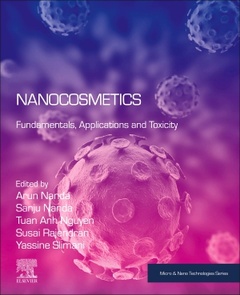Nanocosmetics Fundamentals, Applications and Toxicity Micro and Nano Technologies Series
Coordonnateurs : Nanda Arun, Nanda Sanju, Rajendran Susai, Slimani Yassine, Nguyen Tuan Anh

Nanotechnology is key to the design and manufacture of the new generation of cosmetics. Nanotechnology can enhance the performance and properties of cosmetics, including colour, transparency, solubility, texture, and durability. Sunscreen products, such as UV nano-filters, nano-TiO2 and nano-ZnO particles, can offer an advantage over their traditional counterparts due to their broad UV-protection and non-cutaneous side effects. For perfumes, nano-droplets can be found in cosmetic products including Eau de Toilette and Eau de Parfum.
Nanomaterials can also be used in cosmetics as transdermal drug delivery systems. By using smart nanocontainers, active compounds such as vitamins, antioxidants, nutrients, and anti-inflammatory, anti-infective agents, can be delivered effectively. These smart nanocontainers are typically related with the smart releasing property for their embedded active substances. These smart releases could be obtained by using the smart coatings as their outer nano-shells. These nano-shells could prevent the direct contact between these active agents and the adjacent local environments.
Nanocosmetics: Fundamentals, Applications and Toxicity explores the formulation design concepts and emerging applications of nanocosmetics. The book also focuses on the mitigation or prevention of their potential nanotoxicity, potential global regulatory challenges, and the technical challenges of mass implementation. It is an important reference source for materials scientists and pharmaceutical scientists looking to further their understanding of how nanotechnology is being used for the new generation of cosmetics.
PART 1: BASIC PRINCIPLES 1. Nanocosmetics: An introduction 2. Molecular dynamics study on the skin permeability of nanoparticles 3. Mathematical modeling for transdermal drug absorption 4. Molecular dynamics study of the diffusion of nanoparticles into hair fibers 5. Transdermal and bioactive nanocarriers 6. Nano-emulsions for cosmetic products 7. Nano-structured bio-surfactants for cosmetic applications 8. Nano-biomaterials in cosmetics 9. Water-based nano-perfumes 10. Nano-encapsulated essential oils 11. Organic UV filter loaded nanocarriers with broad spectrum photo-protection
PART 2: EMERGING APPLICATIONS 12. Nanomaterials for haircare applications 13. Nanomaterials in oral care cosmetics 14. Nanomaterials in color cosmetics 15. Nanomaterials in fragrance products 16. Nanomaterials in soap and shower gels 17. Nanomaterials in sun care products 18. Nanomaterials for lip and nail cares applications 19. Nanomaterials for skin care applications
PART 3: POTENTIAL RISKS AND RISK PREVENTION OF NANOCOSMETICS 20. Current legal frameworks and consumer exposure of nanocosmetics 21. Nanoparticle toxicological risks on intact-skin dermal exposures 22. In vitro standard methods for cellular toxicity of nanocosmetics 23. Methods for mitigation and prevention of nanotoxicity in cosmetics
PART 4: FUTURE PERSPECTIVES 24. Current commercial nanocosmetic products 25. Future trends
Sanju Nanda is Professor of Pharmaceutics at Maharshi Dayanand University, India. Her research focuses on nanomaterials used for pharmaceutical applications.
Susai Rajendran is Research Director, Professor of Chemistry St. Antony’s College of Arts and Sciences For Women, India. His research is in the field of corrosion science and engineering, nanotechnology, applications of nanomaterials in corrosion protection study, and environmental studies.
Yassine Slimani is a Professor in the Department of Biophysics, at the Institute for Research and Medical Consultations, Imam Abdulrahman Bin Faisal University, Dammam, Saudi Arabia. His areas of research include materials science, chemical engineering, environmental science, biochemistry, genetics, and molecular biology.
Tuan Anh Nguyen is Principal Research Scientist at the Institute for Tropical Technology, Vietnam Academy of Science and Technology, Hanoi, Vietnam. His research focuses on advanced nanomaterials and nanotechnology for corrosion and materials integrity in transportation systems. His research activities include smart coatings, conducting polymers, corrosion and protection of metals/concrete, antibacterial materials, and advanced nanomaterials.
- Outlines the major fabrication and formulation design concepts of nanoscale products for cosmetic applications
- Explores how nanomaterials can safely be used for various applications in cosmetic products
- Assesses the major challenges of using nanomaterials for cosmetic applications on a large scale
Date de parution : 05-2020
Ouvrage de 504 p.
19x23.3 cm
Thème de Nanocosmetics :
Mots-clés :
Nanotechnology; Nanomaterials; Nanocosmetics; Nanosafety; Cosmetics



